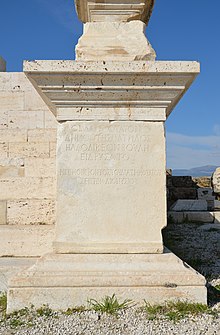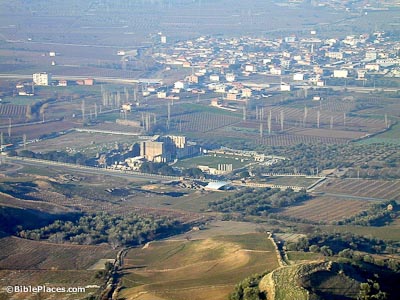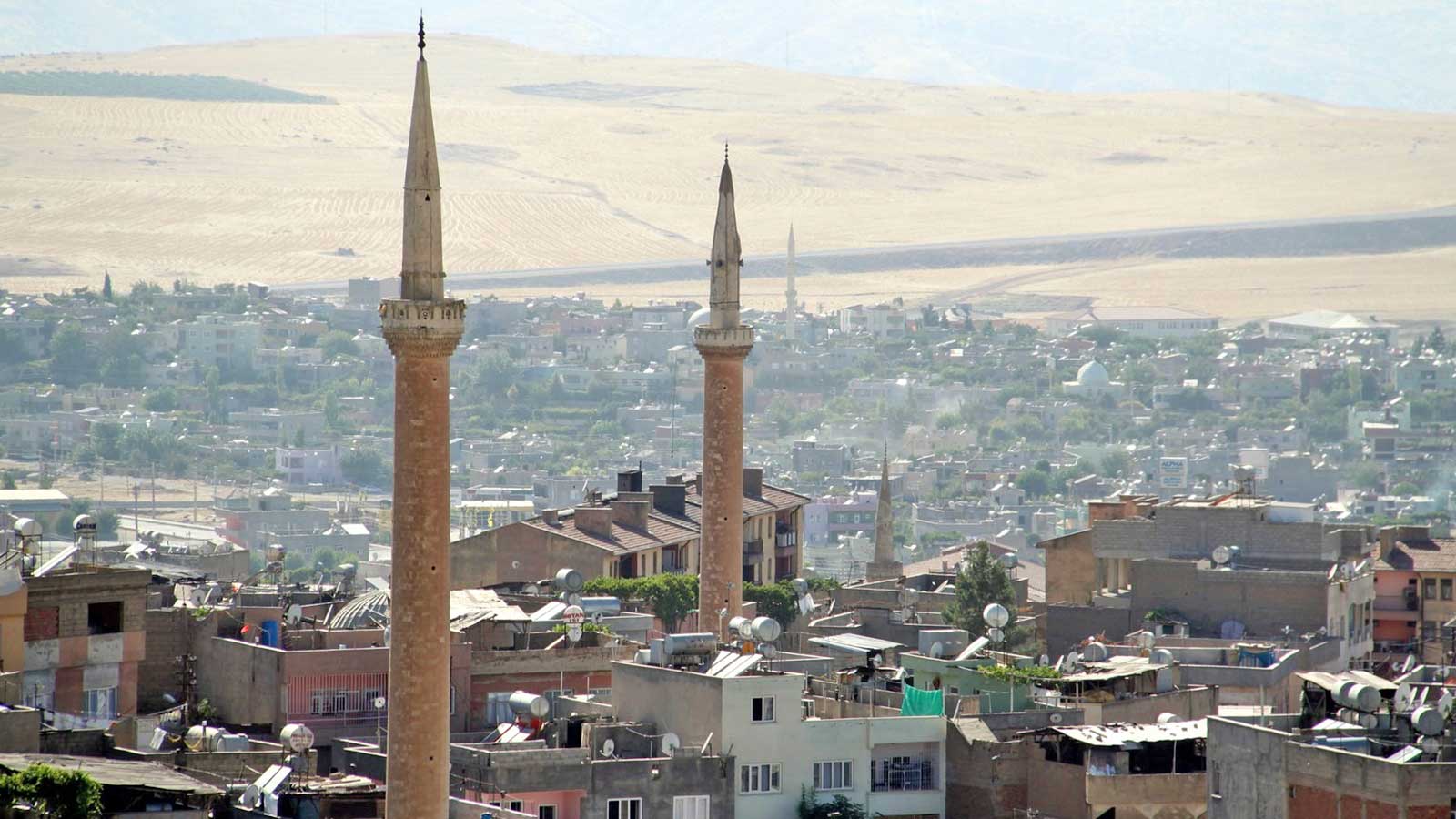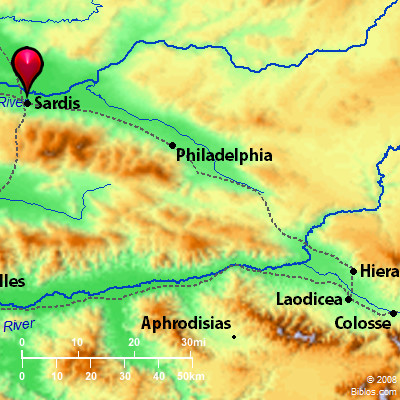
Archaeological site of Laodicea on the Lycus between Pamukkale and Denizli, Turkey. The photo shows the Syria Street.
To the Church in Laodicea
14 “To the angel of the church in Laodicea write:
These are the words of the Amen, the faithful and true witness, the ruler of God’s creation. 15 I know your deeds, that you are neither cold nor hot. I wish you were either one or the other! 16 So, because you are lukewarm—neither hot nor cold—I am about to spit you out of my mouth. 17 You say, ‘I am rich; I have acquired wealth and do not need a thing.’ But you do not realize that you are wretched, pitiful, poor, blind and naked. 18 I counsel you to buy from me gold refined in the fire, so you can become rich; and white clothes to wear, so you can cover your shameful nakedness; and salve to put on your eyes, so you can see.
19 Those whom I love I rebuke and discipline. So be earnest and repent. 20 Here I am! I stand at the door and knock. If anyone hears my voice and opens the door, I will come in and eat with that person, and they with me.
21 To the one who is victorious, I will give the right to sit with me on my throne, just as I was victorious and sat down with my Father on his throne. 22 Whoever has ears, let them hear what the Spirit says to the churches.”
-------------------------------------------------------
Revelation 3:15-16 Amplified Bible (AMP)
--------------------------------------------------------

History
The town was originally called Diospolis, "City of Zeus", and afterwards Rhodas.[8] Excavations in the northern necropolis have shown that the settlement existed before the Hellenistic foundation and was inhabited by the native population.
Laodicea was founded on the site of the older town by Antiochus II Theos, king of the Seleucid Empire, in 261-253 BC in honour of his wife Laodice, together with several other cities of the same name. Laodicea soon became quite wealthy.[citation needed] In 220 BC, Achaeus declared himself king of the region but was defeated by Antiochus the Great in 213 BC. Antiochus transported 2,000 Jewish families to Phrygia from Babylonia.[9] Many of Laodicea's inhabitants were Jews from this time, and Cicero records that Flaccus later confiscated the considerable sum of 9 kg of gold which was being sent annually to Jerusalem for the Temple. [10][11]
After the Battle of Magnesia in 188 BC when the Romans defeated the Seleucids, the Treaty of Apamea was signed which gave control of the whole of western Asia Minor to the Kingdom of Pergamon. With the death of its last king, its territory was bequested to Rome in 133 BC. It received from Rome the title of free city. It suffered greatly during the Mithridatic Wars[12] but quickly recovered under the dominion of Rome. Towards the end of the Roman Republic and under the first emperors, Laodicea benefitted from its advantageous position on a trade route and became one of the most important and flourishing commercial cities of Asia Minor, in which large money transactions and an extensive trade in black wool were carried out.[13][14][15] Its renowned wealth is referred to in the Bible.[16]
During the Roman period Laodicea was the chief city of a Roman conventus, which comprised 24 cities besides itself; Cicero records holding assizes there ca. 50 BC.[17]
Strabo (64 BC - 24 AD) attributes the celebrity of the city to the fertility of the soil and the wealth of some of its inhabitants, amongst whom may have been Hiero of Laodicea, who adorned the city with many beautiful buildings and bequeathed to it more than 2000 talents at his death.[18][19]
The wealth of its inhabitants engendered a taste for the arts of the Greeks, as is manifest from its ruins, and that it contributed to the advancement of science and literature is attested by the names of the sceptics Antiochus and Theiodas, the successors of Aenesidemus (1st century BC),[20] and by the existence of a great medical school.[21] Its wealthy citizens embelliArchaeological site of Laodicea on the Lycus between Pamukkale and Denizli, Turkey. The photo shows the Syria Street.shed Laodicea with beautiful monuments. One of the chief of these citizens, Polemon (r. 37 BC - 8 AD), became King of Armenian Pontus (called after him "Polemoniacus") and of the coast round Trebizond.[22] The city minted its own coins, the inscriptions of which show evidence of the worship of Zeus, Æsculapius, Apollo, and the emperors.
The area often suffered from earthquakes, especially from the great shock that occurred in the reign of Nero (60 AD) in which the town was completely destroyed. But the inhabitants declined imperial assistance to rebuild the city and restored it from their own means.[23]
The martyrdom of Lulianos and Paphos is believed to have happened here.
The Byzantine writers often mention Laod
icea, especially in the time of the Komnenian emperors. In 1119, Emperor John II Komnenos and his chief military commander, John Axouch, captured Laodicea from the Seljuk Turks in the first major military victory of his reign.
It was fortified by the emperor Manuel I Komnenos.[24] In 1206–1230, it was ruled by Manuel Maurozomes. The city was destroyed during the invasions of the Turks and Mongols.
Christianity at Laodicea
Hot and Cold Water
Laodicea was in the Lycus river valley near Colossae and Hierapolis. Unlike Laodicea, these two cities were both well known for their springs of water: cold at Colossae and hot at Hierapolis.
Colossae's water came from dozens of streams that were fed by melting snow on Mt. Cadmus that towered over the city. The snow remained on the mountain even into the middle of summer. Colossae was famous for cold, refreshing water.
Hierapolis' water came from the white cliffs near the city that were warmed by volcanic activity beneath the area. Hierapolis was known for their enormous, hot, healing baths. People came from hundreds of miles around to find cure of their ailments in the hot baths of Hierapolis.
Laodicea, on the other hand, had very poor water that was tepid and filled with minerals. The water pipes in the ruins of Laodicea still hold several inches of thick mineral deposits. Laodicea was, however, known for their three primary industries:
- the incredibly soft, black wool of its sheep that was used to make luxury garments
- its banking industry that provided a gold exchange
- and a salve that was used for healing eye and ear problems
These three industries made Laodicea a very wealthy city.
There is a story that tells of the great wealth of Laodicea. One time the entire town was destroyed by an earthquake and the emperor offered to rebuild the city. The citizens declined his offer because of their great wealth. "We have no need of your aid because we are wealthy", they said.
-------------------------------------------
The Church in Laodicea: Era of “Higher Criticism” (A.D. 1900–Tribulation)
7. LAODECIA – this means ‘the people ruling’ or ‘the judgement of the
people’. Here is the last Church Age or Period. It is the worst of the
cameo or types of Churches seen. The Lord does not really reign in their
midst – they do!
------------------------------------------

John Gresham Machen (/ˈɡrɛsəm ˈmeɪtʃən/;[b] 1881–1937) was an American Presbyterian New Testament scholar and educator in the early 20th century. He was the Professor of New Testament at Princeton Seminary between 1906 and 1929, and led a revolt against modernist theology at Princeton and formed Westminster Theological Seminary as a more orthodox alternative. As the Northern Presbyterian Church continued to reject conservative attempts to enforce faithfulness to the Westminster Confession, Machen led a small group of conservatives out of the church to form the Orthodox Presbyterian Church. When the northern Presbyterian church (PCUSA) rejected his arguments during the mid-1920s and decided to reorganize Princeton Seminary to create a liberal school, Machen took the lead in founding Westminster Seminary in Philadelphia (1929) where he taught New Testament until his death. His continued opposition during the 1930s to liberalism in his denomination's foreign missions agencies led to the creation of a new organization, the Independent Board for Presbyterian Foreign Missions (1933). The trial, conviction and suspension from the ministry of Independent Board members, including Machen, in 1935 and 1936 provided the rationale for the formation in 1936 of the OPC.
Machen is considered to be the last of the great Princeton theologians who had, since the formation of the college in the early 19th century, developed Princeton theology: a conservative and Calvinist form of Evangelical Christianity. Although Machen can be compared to the great Princeton theologians (Archibald Alexander, Charles Hodge, A. A. Hodge, and B. B. Warfield), he was neither a lecturer in theology (he was a New Testament scholar) nor did he ever become the seminary's principal.
Machen's influence can still be felt today through the existence of the institutions that he founded: Westminster Theological Seminary, the Independent Board for Presbyterian Foreign Missions, and the Orthodox Presbyterian Church. In addition, his textbook on basic New Testament Greek is still used today in many seminaries, including PCUSA schools.
https://en.wikipedia.org/wiki/J._Gresham_Machen
-----------------------------------------

The fundamentalist–modernist controversy is a major schism that originated in the 1920s and 1930s within the Presbyterian Church in the United States of America. At issue were foundational disputes about the role of Christianity; the authority of the Bible; and the death, resurrection, and atoning sacrifice of Jesus Christ.[1] Two broad factions within Protestantism emerged: fundamentalists, who insisted upon the timeless validity of each doctrine of Christian orthodoxy; and modernists, who advocated a conscious adaptation of the Christian faith in response to the new scientific discoveries and moral pressures of the age. At first, the schism was limited to Reformed churches and centered around the Princeton Theological Seminary which had fundamentalist faculty members found Westminster Theological Seminary when Princeton went in a liberal direction. However, it soon spread, affecting nearly every Protestant denomination in the United States. Denominations that were not initially affected, such as the Lutheran churches, eventually were embroiled in the controversy, leading to a schism in the United States.
By the end of the 1930s, proponents of theological liberalism had, at the time, effectively won the debate,[2] with the modernists in control of all mainline Protestant seminaries, publishing houses, and denominational hierarchies in the United States.[3] More conservative Christians withdrew from the mainstream,[3] founding their own publishing houses (such as Zondervan), universities (such as Biola University), and seminaries (such as Dallas Theological Seminary and Fuller Theological Seminary). This would remain the state of affairs until the 1970s, when conservative Protestantism emerged on a larger scale in the United States, resulting in the rise of conservatism among the Southern Baptists, Presbyterians, and others.
https://en.wikipedia.org/wiki/Fundamentalist%E2%80%93modernist_controversy

Part of Speech: Noun, Neuter
Transliteration: kollourion
Phonetic Spelling: (kol-loo'-ree-on)
Definition: eye salve
Usage: eye-salve.
Isaiah 55
New International Version
Invitation to the Thirsty
1 “Come, all you who are thirsty,
come to the waters;
and you who have no money,
come, buy and eat!
Come, buy wine and milk
without money and without cost.55 “Come, all you who are thirsty,
come to the waters;
and you who have no money,
come, buy and eat!
Come, buy wine and milk
without money and without cost.
2 Why spend money on what is not bread,
and your labor on what does not satisfy?
Listen, listen to me, and eat what is good,
and you will delight in the richest of fare.
3 Give ear and come to me;
listen, that you may live.
I will make an everlasting covenant with you,
my faithful love promised to David.
4
2 Why spend money on what is not bread,
and your labor on what does not satisfy?
Listen, listen to me, and eat what is good,
and you will delight in the richest of fare.
3 Give ear and come to me;
listen, that you may live.
I will make an everlasting covenant with you,
my faithful love promised to David.
----------------------------------------------------


















